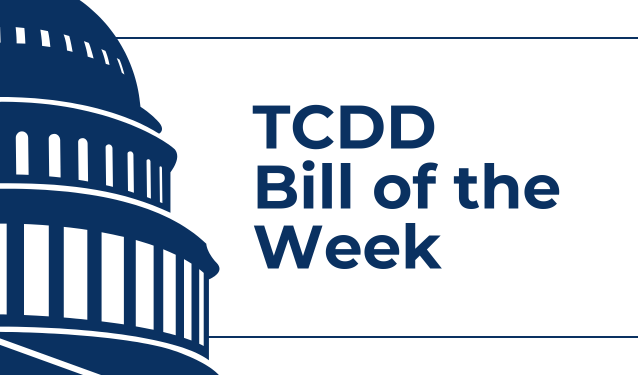
Texas Legislative News: June 24, 2025
We continue taking stock of the legislative session by looking at how lawmakers addressed health and safety for Texans with DD.

We continue taking stock of the legislative session by looking at how lawmakers addressed health and safety for Texans with DD.

Texas lawmakers advanced some new measures for people with DD, but several gaps remain in ensuring full personal and civil rights.

See how Texas lawmakers sought to address critical accessibility issues for Texans with DD during the recent legislative session.

The TCDD Bill of the Week highlighted 19 pieces of legislation. Here’s where they ended up.

As lawmakers adjourn the 89th Legislature, Gov. Greg Abbott has until June 22 to sign, veto, or allow bills to take effect without his signature.

We continue taking stock of the legislative session by looking at how lawmakers addressed health and safety for Texans with DD.

Texas lawmakers advanced some new measures for people with DD, but several gaps remain in ensuring full personal and civil rights.

See how Texas lawmakers sought to address critical accessibility issues for Texans with DD during the recent legislative session.

The TCDD Bill of the Week highlighted 19 pieces of legislation. Here’s where they ended up.

As lawmakers adjourn the 89th Legislature, Gov. Greg Abbott has until June 22 to sign, veto, or allow bills to take effect without his signature.

We continue taking stock of the legislative session by looking at how lawmakers addressed health and safety for Texans with DD.

Texas lawmakers advanced some new measures for people with DD, but several gaps remain in ensuring full personal and civil rights.

See how Texas lawmakers sought to address critical accessibility issues for Texans with DD during the recent legislative session.

The TCDD Bill of the Week highlighted 19 pieces of legislation. Here’s where they ended up.

As lawmakers adjourn the 89th Legislature, Gov. Greg Abbott has until June 22 to sign, veto, or allow bills to take effect without his signature.
6201 E. Oltorf St., Ste. 600
Austin, TX 78741-7509
Phone: 512-437-5432
Toll-Free: 1-800-262-0334
Email: tcdd@tcdd.texas.gov
TCDD welcomes innovative ideas and suggestions of activities to implement the Goals and Objectives in the TCDD State Plan.
Email tcdd@tcdd.texas.gov or complete the online feedback form to submit your ideas.
6201 E. Oltorf St., Ste. 600
Austin, TX 78741-7509
Phone: 512-437-5432
Toll-Free: 1-800-262-0334
Email: tcdd@tcdd.texas.gov
TCDD is committed to ensuring digital accessibility for everyone. We continually work on compliance, applying best practices and web standards. To learn more, read our accessibility statement.
6201 E. Oltorf St., Ste. 600
Austin, TX 78741-7509
Email: tcdd@tcdd.texas.gov
This work is supported by a grant from the U.S. Administration for Community Living (ACL), Department of Health and Human Services (HHS), Washington, D.C. 20201 with a 100% federal funding award totaling $6,161,072. Council efforts are those of the grantee and do not necessarily represent the official views of nor are endorsed by ACL, HHS, or the U.S. government.